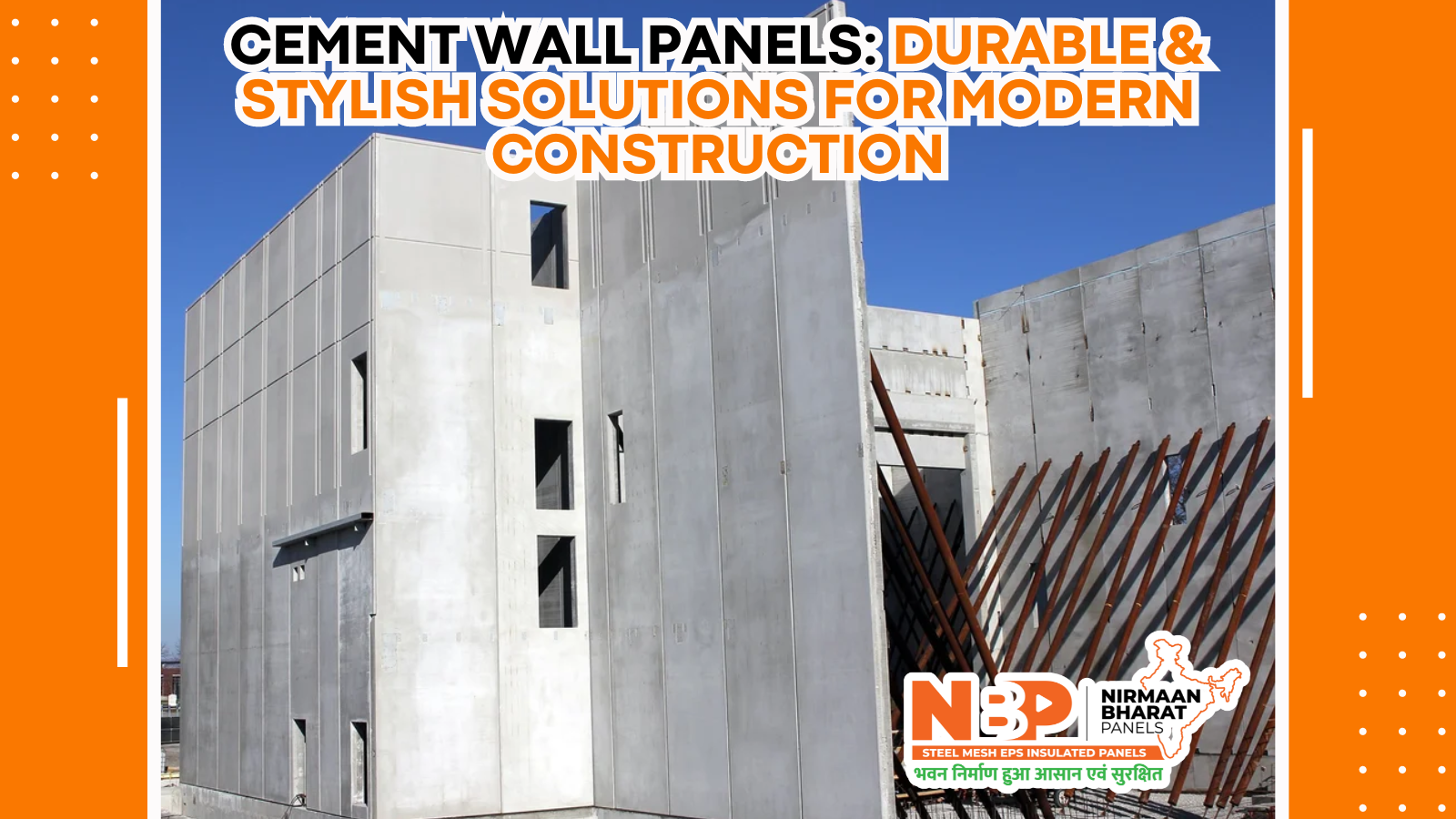Cement wall panels are increasingly recognized as a superior choice in modern construction, offering a unique combination of durability, versatility, and aesthetic appeal. These panels are designed to meet the demands of contemporary building projects while enhancing both functionality and design. Here’s an in-depth look at why cement wall panels stand out as an ideal solution for today’s construction needs:
Table of Contents
Toggle1. Unmatched Durability and Strength
Cement wall panel are engineered to offer unmatched durability. Composed of a blend of high-quality cement, and aggregates, and often reinforced with fibers, these panels are designed to endure significant physical stress. They resist impact, weathering, and abrasion, making them an ideal choice for environments subjected to harsh conditions. Whether exposed to extreme weather, heavy traffic, or accidental impacts, cement wall panel maintain their integrity and appearance over time.
Impact Resistance: Cement wall panel withstand significant physical stress and impacts, making them suitable for high-traffic areas.
Weathering: Their resistance to weather elements such as rain, wind, and UV radiation ensures long-term performance without degradation.
Wear and Tear: Durable against abrasion and everyday wear, maintaining their structural integrity over time.
2. Customizable Aesthetic Flexibility
One of the most compelling features of cement wall panels is their adaptability in design. These panels can be manufactured in a wide array of textures, colours, and finishes, allowing architects and designers to achieve virtually any aesthetic vision. From sleek, modern lines to traditional and rustic appearances, cement panels offer the flexibility to match diverse architectural styles. Customization options include smooth surfaces, embossed patterns, and even faux stone or wood finishes, enabling a broad range of design possibilities.
Customization: Available in a wide range of textures, colours, and finishes, including smooth, rough, and patterned surfaces.
Architectural Flexibility: Can mimic other materials like stone or wood, allowing for diverse architectural styles.
Design Adaptability: Easily integrated into various design schemes, from contemporary to traditional.
3. Exceptional Fire Safety Features
Cement wall panels are renowned for their excellent fire resistance. Unlike many other materials, cement does not burn, melt, or emit harmful fumes when exposed to high temperatures. This inherent fire-resistant property makes cement panels an essential component in buildings where safety is paramount, such as high-rise structures, commercial spaces, and public buildings. They contribute to enhanced fire protection by slowing the spread of flames and providing critical time for evacuation.
Non-Combustible Material: Cement does not burn, providing a critical safety feature in fire-prone areas.
Flame Spread Prevention: Slows down the spread of flames, contributing to safer evacuation and reduced fire damage.
Toxic Fume Resistance: Does not emit harmful fumes when exposed to high temperatures.
4. Minimal Maintenance Needs
One of the major advantages of cement wall panels is their minimal maintenance needs. The panels are resistant to common issues such as stains, mold, and mildew, which can affect other materials over time. Their non-porous surface makes cleaning straightforward and infrequent, reducing the overall maintenance burden. This durability leads to long-term cost savings by minimizing the need for frequent repairs or replacements.
Stain Resistance: Non-porous surface resists stains, making cleaning simple and infrequent.
Mold and Mildew: Resistant to mold and mildew growth, reducing the need for periodic treatments.
Durable Finish: Maintains its appearance without requiring regular touch-ups or repairs.
5. Enhanced Energy Efficiency
Cement wall panels significantly enhance a building’s energy efficiency. The panels offer excellent thermal insulation properties, which help to regulate indoor temperatures by reducing heat transfer. This insulation capability not only enhances comfort within the building but also leads to lower energy consumption for heating and cooling. By improving thermal performance, cement panels contribute to reduced energy bills and a smaller environmental footprint.
Thermal Insulation: Provides effective insulation, reducing heat transfer and maintaining stable indoor temperatures.
Cost Savings: This leads to lower heating and cooling costs due to improved energy efficiency.
Environmental Impact: Contributes to a smaller carbon footprint by enhancing the building’s energy performance.
6. Eco-Friendly Building Material
Cement wall panels are aligned with sustainable building practices. Many manufacturers incorporate recycled materials into the production of cement panels, and the panels themselves are fully recyclable at the end of their lifecycle. This eco-friendly approach supports green building certifications and reduces the environmental impact of construction projects. Additionally, the longevity and low maintenance requirements of cement panels contribute to their sustainability by minimizing the need for replacements and repairs.
Recycled Content: Many panels incorporate recycled materials in their production, supporting eco-friendly practices.
Recyclability: Fully recyclable at the end of their lifecycle, aligning with green building certifications.
Reduced Environmental Impact: Long lifespan and low maintenance requirements minimize overall environmental impact.
7. Advanced Soundproofing Capabilities
The density and composition of cement wall panels provide effective soundproofing, making them an excellent choice for environments where noise control is essential. By absorbing and blocking sound, the panels contribute to the creation of quieter interior environments. This is particularly beneficial in settings such as residential apartments, offices, and educational institutions where noise reduction is a key concern. The soundproofing capabilities of cement wall panels create a more comfortable and productive environment.
Noise Reduction: Improves indoor acoustic comfort by efficiently blocking and absorbing sound.
Quieter Environments: Ideal for residential, commercial, and institutional settings where noise control is essential.
Sound Insulation: Contributes to a peaceful and productive environment by minimizing external noise disturbances.
8. Efficient and Simplified Installation
Cement wall panel are designed for efficient installation, which can significantly streamline the construction process. Their modular nature allows for quick and straightforward assembly, reducing labor costs and project timelines. The panels are typically pre-fabricated and can be easily cut or shaped on-site to accommodate specific design requirements. This ease of installation not only accelerates construction but also minimizes disruption during the building process.
Modular Design: Pre-fabricated panels allow for quick and efficient installation, reducing construction time.
On-Site Customization: Panels can be cut and shaped to fit specific design needs on-site, facilitating flexibility.
Labour Efficiency: Simplifies the installation process, leading to lower labour costs and streamlined project completion.
9. Enhanced Structural Support and Stability
Cement wall panels contribute to the overall structural integrity of a building. Their robust construction provides additional support to walls, making them suitable for both load-bearing and non-load-bearing applications. When used in conjunction with other structural elements, cement panels enhance the building’s stability and load-bearing capacity. This strength ensures that the panels can support additional loads and resist external forces, contributing to the building’s safety and longevity.
Load-Bearing Capacity: Provides additional support and stability, suitable for both load-bearing and non-load-bearing applications.
Structural Support: Enhances overall building strength when combined with other structural elements.
Resilience: Offers robust performance against external forces and load pressures.
10. Cost-Effective Construction Solution
Despite their premium qualities, cement wall panels offer a cost-effective solution for construction. Their combination of durability, energy efficiency, and low maintenance requirements provides substantial long-term value. While the initial investment in cement panels may be higher than some traditional materials, the benefits of reduced maintenance, lower energy bills, and extended lifespan make them a financially advantageous choice. The overall cost-effectiveness is particularly evident in large-scale projects where performance and longevity are crucial.
Initial Investment: Provides a balance between initial cost and long-term benefits, including durability and performance.
Long-Term Value: Lowers ongoing costs by minimizing maintenance needs and reducing energy bills.
Economic Advantage: Particularly advantageous in large-scale projects where performance and cost-efficiency are critical.
Conclusion
Cement wall panel represent a sophisticated solution for modern construction, combining exceptional durability, design flexibility, and functional benefits. Their resilience, aesthetic adaptability, and performance characteristics make them a valuable choice for a wide range of building applications. Whether for residential, commercial, or industrial projects, cement wall panels offer a compelling blend of style and substance, meeting the diverse needs of contemporary construction while delivering long-term value and efficiency.



